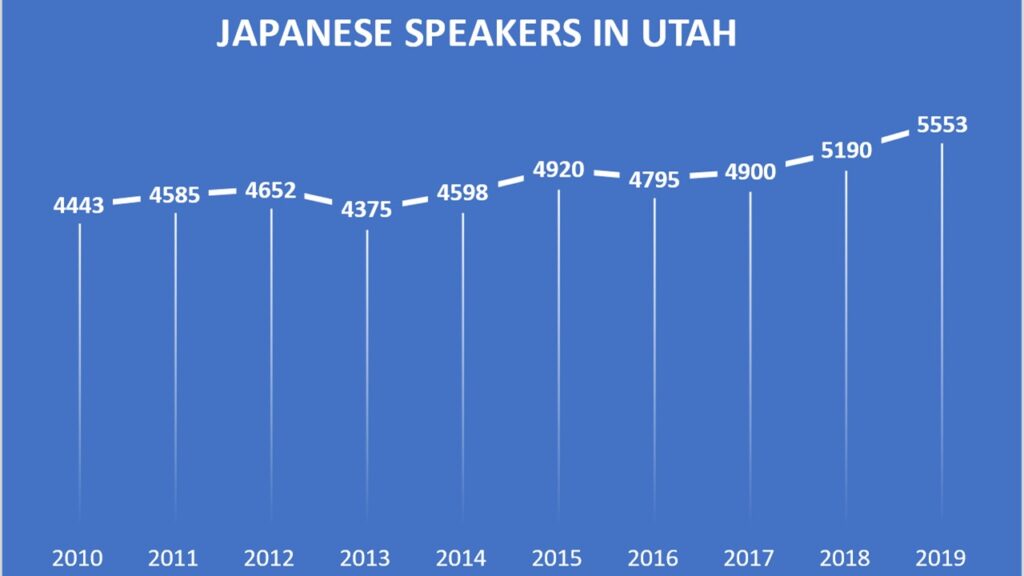Note: Speakers of other languages from Japan such as Okinawan may be found within this community, as they are not usually separated out by the Census and other researchers.
The Japanese-speaking community in Utah has both one of the oldest and saddest histories of any Utah community. Outside of Utah they are perhaps best known for the surge during World War II when thousands were forced to relocate to the Topaz internment camp near Delta, UT. But their history extends to far before the war began, and despite a decline after the war, the community of Japanese speakers continues to thrive. Like most immigrant languages, Japanese is most commonly spoken in the larger cities along the Wasatch Front.
Current population: 5,553 (2019 estimate)

History
The first known visit of a native Japanese speaker was by Ambassador Extraordinary Iwakura on Februaryu 7, 1872. The first permanent immigrants from Japan arrived in 1884.
Period 1: 1884-1925
Earliest immigrants worked in mining communities, farming, sugar beet farming, railroads (replacing Chinese as they left following exclusion act).
Period 2: 1940-1945
Next phase was internal migration due to WW2. Much of this was “voluntary” as demonstrated by the arrival of thousands of Japanese and various organizations that relocated from California to Salt Lake, including the JACL and Pacific Citizen. However, the majority of internal migrants came as part of the forced relocation to the Japanese internment camp at Topaz (including the Buddhist Churches of America, making the Intermountain Buddhist Church in Salt Lake the default hub for the organization nation-wide).
Period 3: 1945-1965
In the period immediately following the war, the most conspicuous Japanese arrivals to the United States were military brides from Military bases in Japan. Though interracial marriage was still illegal in Utah during this period.
Period 4: 1965-Present
University students and LDS converts.
Major Japanese Communities
Period 1: Carbon, Emery, Grand, Summit Countes. Wendover, Tooele, Eureka, Delta. Carbon County – Helper, Price. Bingham Canyon Copper Mine. Salt Lake, Ogden.
Period 2: Salt Lake, Ogden, Wasatch County (farming community at Keetley that was later attacked). Topaz Internment Camp.
Period 3: Salt Lake and Ogden.
Period 4: Utah County. Wasatch Front.
Newspapers
There are no current Utah periodicals published in Japanese, but historic newspapers include: The Rocky Mountain Times; The Utah Nippo; Pacific Citizen (WW2); Sanchubu to Nihonjin (?)
University Classes
For the last 30 years an average of over 1,100 students a year have consistently studied Japanese at Utah universities. Brigham Young University (BYU) has consistenly led the state for enrollment in Japanese classes, though interest has declined somewhat in recent years. Though the decline in enrollment at BYU has more than been made up for at other universities in the state, in particular at Utah Valley University, a school that has rapidly since the early 90s to become the largest university in the state.
Univesities by Enrollment in Japanese Classes
| Brigham Young University | 380 |
| University of Utah | 220 |
| Utah Valley | 170 |
| Weber State | 110 |
| Utah State | 100 |
| Salt Lake Community College | 90 |
| Dixie State | 40 |
| Snow College | 20 |
| Westminster | 10 |
Religions
Intermountain Buddhist Churches of Salt Lake, Ogden, and Honeyville; Japanese Church of Christ in Salt Lake; Ogden Japanese Church; LDS Wards
Organizarions
JACL (Pacific Citizen is publication); growers organizations, and prefectural societies.
Events
Traditionally picnics at Lagoon, Davis high school, and local community organizations. Movies, Kabuki, Koto, Shamisen performances largely pre-WW2
Sports
Baseball; Basketball; Judo; Kendo leagues pre WW2
Businesses
Sunrise Fish Market, Family Market, Aloha Cafe, California Market, Pagoda*, JACL Credit Union*, Utah Nippo, Sage Farm Market*, Ami’s Book Store, Nisei Watch Shop, Mikado* (remnants of Salt Lake Japantown)
Sister Cites
Matsumoto/Salt Lake
Public Monuments
Peace Park in South Jordan
Related Communities
Okinawan
Utah Okinawa Kenjinkai
Website